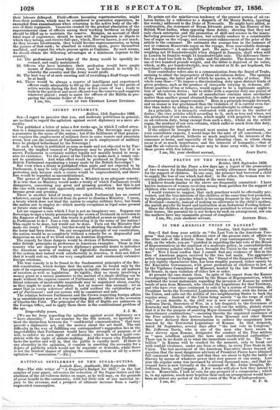RATIONAL SETTLEMENT OF THE SUGAR-DUTIES.
Lesketh How, timbleside, 22d September 1866.
SIR—The able writer of "A Projector's Budget for 1857," in the last number of your paper, advocates the reduction of the Sugar-duties and the abolition of the ad-valorem duties on sugar, as he well may, on the grounds of great benefit to the community, with but little risk of any material in- jury to the revenue, and a prospect of ultimate increase from a vastly- augmented consumption. He points out the mischievous tendency, of the present system of ad-va- lorem duties, by a reference to a despatch of Sir Henry Barkly, (quoting the words,) addressed to the Duke of Newcastle. He might have added, in confirmation, the statement of Bryan Edwards given in his History of the British West Indies, when opposing these duties ; showing that they not only check enterprise and the promotion of skill and science in the manu- facturing processes in:our Colonies, but actually conduce to a considerable loss of sugar on the voyage, and consequent enhancement of the price of the article to the consumer. He estimates the average loss in the instance of raw or common Muscovado sugar on the voyage, from unavoidable drainage and fermentation, at one-eighth part. He says—" A hogshead of sugar weighing net 16 hundredweight when shipped in Jamaica, shall when sold in London be found to weigh 14 hundredweight only. The difference there- fore is a dead loss both to the public and the planter. The former lose the use of two hundred pounds weight, and the latter is deprived of its value, which, at 408. per hundredweight, may be stated at 31.6r. per hogshead, the merchant's charges deducted."
Your contributor refers also to a communication from the Board of Trade, seeming to admit the impropriety of these ad-valorem duties. The opening of the passage, the latter part of which he quotes, is worthy of notice. The whole runs thus—" To impose a discriminating duty upon distinct kinds of given produce, such as the produce of vineyards varying in richness, dif- ferent qualities of tea or tobacco, would appear to be a legitimate applica- tion of ad-valorem duties ; but to strike with a superior duty one pound of sugar, which by a better mode of manufacture contains more saccharine matter than another pound obtained from the same raw material, is to inflict discouragement upon improvements." Here is a principle brought forward, and no sooner is war proclaimed than the violation of it is carried even fur- ther than before by adding 4r. duty per hundredweight to refined sugar. As a principle, it is strangely contrasted with practice in the matter of duties; the very articles which according to it, such as teas and wines, not the production of our own colonies, which might with propriety be charged an ad-valorem duty, being exempt from such a duty, whilst on the article sugar, the produce of our own colonies, which suffer so much from this duty, it is unrelentingly inflicted.
If the subject be brought forward next session for final settlement, as your contributor expects, I would hope for the sake of all concerned,—the interests of our planters, hitherto so much neglected, the interests of the consumer at home, and especially of the labouring class, to whom cheap sugar is of so much importance, and the interests of humanity,—that at least the ad-valorem duties on sugar may be done away with, in favour of those grown with free labour.


























 Previous page
Previous page